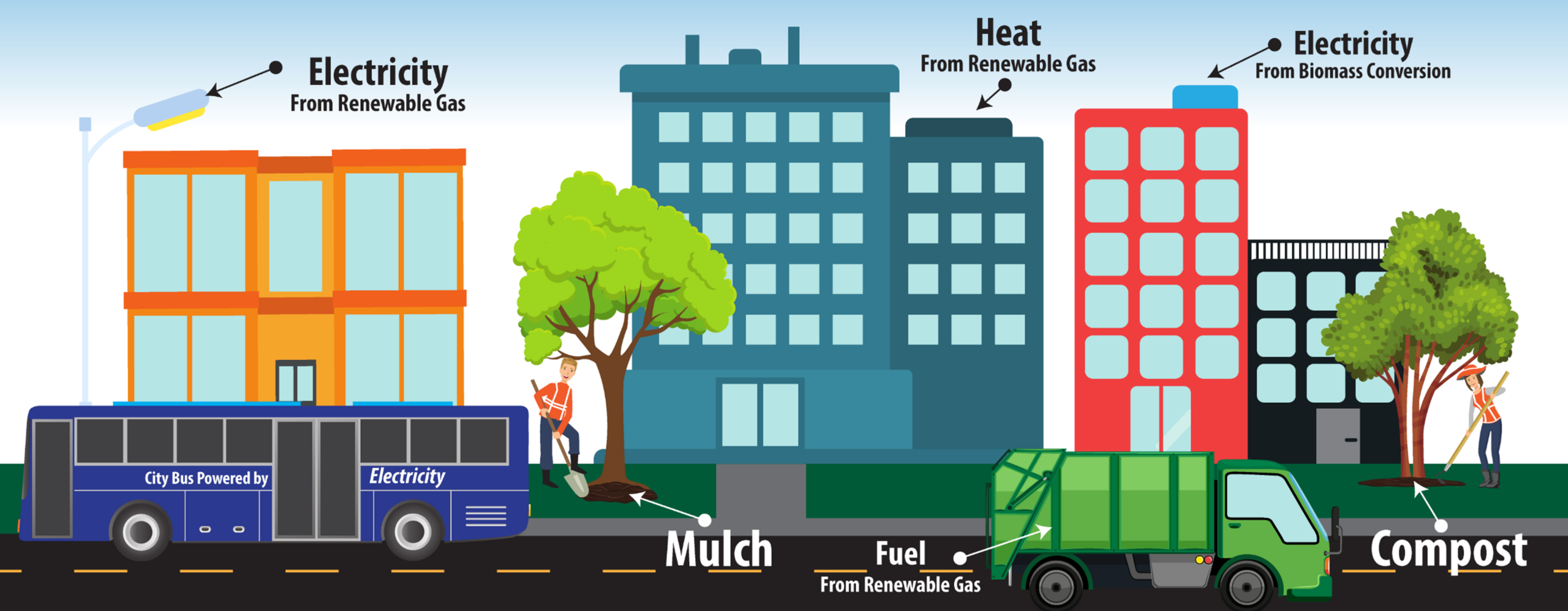
Cityscape showing use of recovered organic waste products, including compost and mulch used in landscaping around buildings, and biomass electricity and electricity from renewable gas powering buildings, a city bus, and streetlights.
Procurement Target
Beginning January 1, 2022, cities and counties will be required to procure recovered organic waste products to meet an annual procurement target. Recovered organic waste products include:
- Compost
- Mulch
- Renewable energy (transportation fuel, electricity, and gas for heating) from anaerobic digestion
- Electricity from biomass conversion
If rural jurisdictions are granted an exemption from the SB 1383 organic waste collection requirements, they will be eligible to delay implementation of the procurement requirements until January 1, 2027 [see 14 CCR Section 18993.1(l)]. Rural jurisdictions may apply for an exemption through CalRecycle’s waivers and exemption webpage.
Each jurisdiction’s procurement target is calculated by multiplying its population, as reported by the California Department of Finance, by the per capita procurement target (0.08 tons of organic waste per California resident per year). The resulting procurement target can then be multiplied by product conversion factors (as established by the regulations) to determine the annual procurement requirements for recovered organic waste products.
Each jurisdiction’s annual procurement target for calendar year 2022 will be in place for five years (January 1, 2022-December 31, 2026), after which it will be recalculated to account for changes in each jurisdiction’s population.
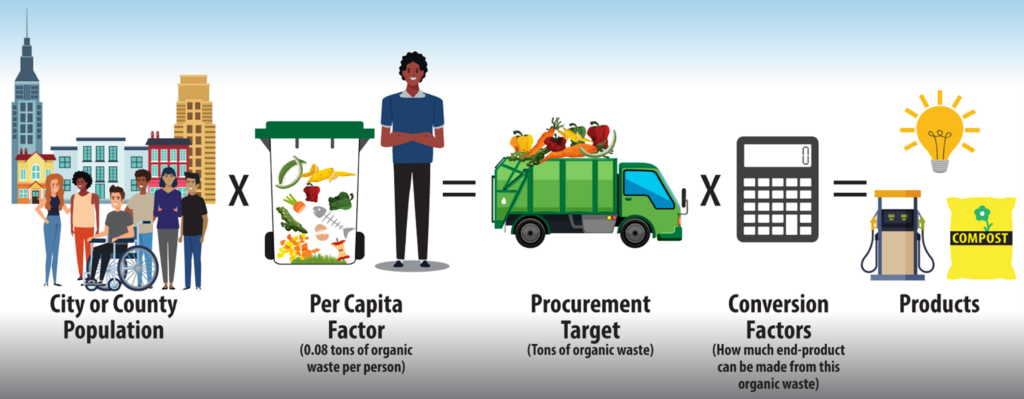
Example:
A jurisdiction has the option to procure any combination of one or more products to fulfill 100 percent of its procurement target. CalRecycle’s Procurement Calculator Tool can be used to calculate the quantities of products a jurisdiction may procure.
The graphic below demonstrates how a jurisdiction of 100,000 residents might meet 100 percent of its annual procurement target (8,000 tons of organic waste) through the procurement of one single type of product.
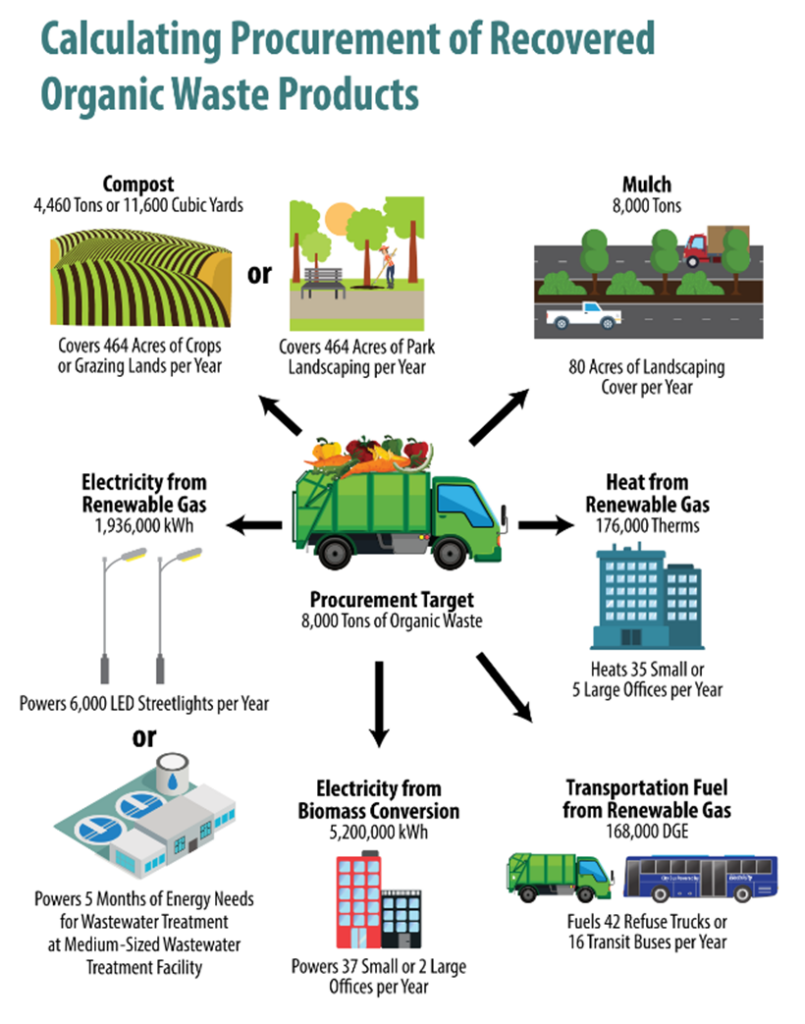
Graphic showing how a jurisdiction of 100,000 residents might meet 100 percent of its annual procurement target (8,000 tons of organic waste) through the procurement of one single type of product. 8,000 tons of organic waste is equivalent to 4,460 tons or 11,600 cubic yards of compost, 8,000 tons of mulch, 1,936,000 kWh of electricity from renewable gas, 176,000 therms of gas used for heating, 5,200,000 kWh of electricity from biomass conversion, or 168,000 DGE of transportation fuel from renewable gas.
Examples of Eligible Products and Procurement
Jurisdictions can fulfill their procurement target through the use or giveaway of any of the recovered organic waste products. Below are some examples of how these eligible products may be procured and used.
Compost & Mulch
A jurisdiction that owns an organics recovery facility can procure compost and mulch end products for city or county use or giveaway. It can also meet its procurement requirements by contracting with a direct service provider that uses or gives away organic end products on its behalf. Compost and mulch have a wide range of potential end uses, such as:
- Giveaways to the public, community groups, or community gardens
- Use in agriculture or rangelands (e.g., partnership through a direct service provider agreement)
- Use in publicly managed landscaping, such as around city or county buildings, parks, and recreational spaces
- Use in environmental management practices such as carbon sequestration, erosion control, fire remediation, stormwater management, and bioremediation of contaminated soil (e.g., partnership with an organization implementing these practices)
The scenarios described below demonstrate a few ways a jurisdiction can meet its procurement target with compost and mulch:
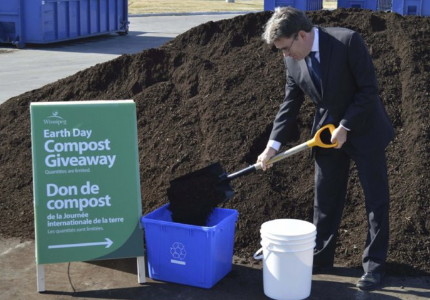
Community Benefits Agreements
Community benefits agreements are a great opportunity for organics recovery facilities, such as composting facilities, to act as good neighbors in their communities. These agreements can commit to providing benefits to the community, such as reducing environmental impacts, building sustainability awareness, and providing quality compost and mulch for local use through giveaway events for residents. Such an agreement could establish the organics recovery facility as a direct service provider to its jurisdiction, providing opportunity for these compost and mulch giveaways to count towards the jurisdiction’s procurement target.

Update Existing Policies
A jurisdiction may include its annual procurement obligations in an existing Climate Action Plan, Model Water Efficient Landscape Ordinance (MWELO), or other local policies that already identify the use of recycled organics materials. Requiring use of eligible recovered organic waste products in existing programs, such as compost and mulch in municipal MWELO projects, allows opportunity to comply with multiple programs. Jurisdictions looking to update their policies, such as MWELO, may look to CalRecycle’s Model Procurement Policy for example policy language.
Energy Products from Anaerobic Digestion
Renewable gas produced from the anaerobic digestion of landfill-diverted organic wastes has a wide range of potential end uses, such as:
- Renewable transportation fuel or electricity to power vehicles, such as bus or refuse fleets owned by a jurisdiction or its contracted direct service providers (e.g., a franchised waste hauler)
- Electricity used for a jurisdiction’s facilities or operations, or used by its direct service provider
- Renewable gas used for heating applications, such as cooking, space heating, or heating needs of equipment (e.g., heating an in-vessel digester)
The scenarios described below demonstrate how energy products could be procured to count towards a jurisdiction’s procurement target:

Transportation Fuel: Procurement through a Direct Service Provider
A jurisdiction may establish a direct service provider agreement with a waste hauler to procure transportation fuel from a permitted anaerobic digestion facility in California and use the CNG to fuel its waste collection fleet on behalf of the jurisdiction.

Electricity: Direct Procurement
A jurisdiction’s publicly owned treatment works (POTW) may use renewable gas that is produced from co-digested organic solid wastes for on-site power needs, provided all regulatory requirements are met (e.g., organic waste is received directly from an eligible solid waste facility or operation).
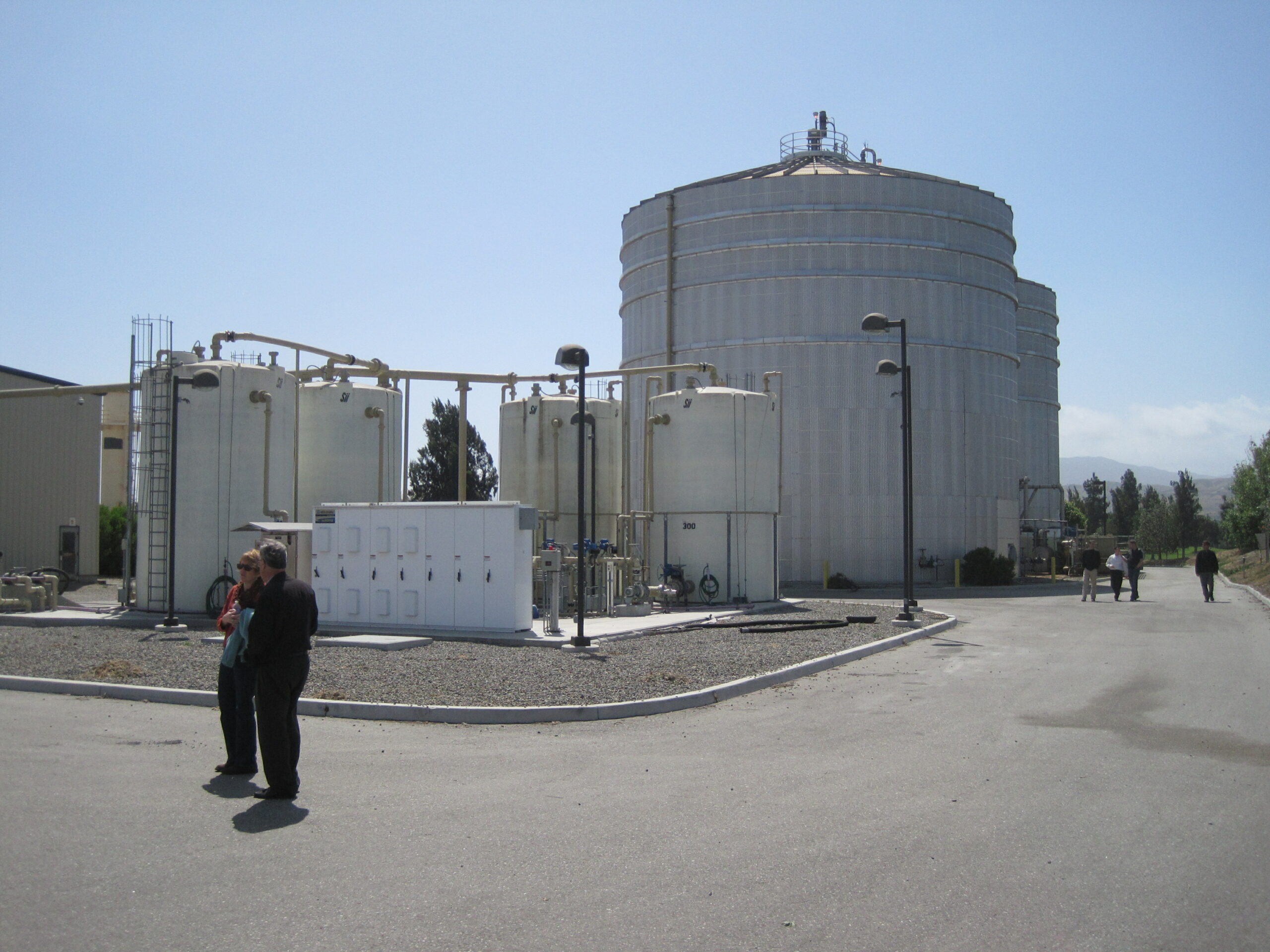
Electricity and Heating Applications: Procurement through a Direct Service Provider
A jurisdiction may establish a direct service provider agreement with an anaerobic digestion facility that operates combined heat and power (CHP) units, which produce renewable electricity and heat from the renewable gas produced, and use the electricity and recovered heat on-site, such as to heat the digesters.
Electricity Produced from Biomass Conversion
Electricity produced from biomass conversion may be eligible to count towards a jurisdiction’s procurement target if the facility receives organic waste from an eligible solid waste facility or operation. For example, a biomass conversion facility may produce electricity from biomass feedstock, such as tree and brush prunings received from an eligible composting facility, and provide this biomass power to a neighboring solid waste transfer station. If a jurisdiction arranges a direct service provider agreement with the transfer station, the transfer station’s use of biomass electricity could count towards the jurisdiction’s procurement target.
Adjusted Procurement Target
Some jurisdictions may qualify to lower their annual procurement target and reduce the quantity of products they must procure if their procurement target exceeds their procurement of transportation fuel, electricity, and gas used for heating applications in the previous year, as measured in tons of organic waste. For more information on this adjustment, please see 14 CCR Section 18993.1(j) and CalRecycle’s Procurement Q&As.
CalRecycle Contacts and Assistance
For any inquiries on the SB1383 requirements: SLCP.Organics@calrecycle.ca.gov
For general inquiries on compost and mulch or bioenergy and anaerobic digestion: Organics@calrecycle.ca.gov
Tools and Resources
SB 1383 Procurement Regulations (14 CCR Article 12)
List of Annual Jurisdiction Procurement Targets
Compost & Mulch
Renewable Gas
Biomass Conversion
Procurement Tools
For more information contact: Short-Lived Climate Pollutants (SLCP), Organic Waste Methane Emissions Reductions, SLCP.Organics@calrecycle.ca.gov
